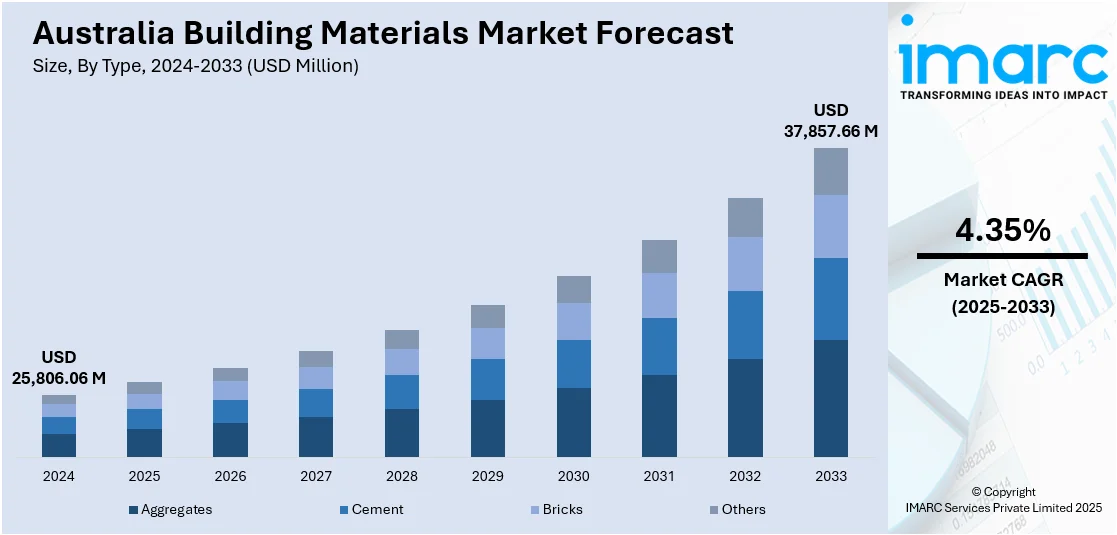Australia Building Materials Market 2025 | Worth USD 37,857.66 Million by 2033
The Australia building materials market size reached USD 25,806.06 Million in 2024. Looking forward, IMARC Group expects the market to reach USD 37,857.66 Million by 2033, exhibiting a growth rate (CAGR) of 4.35% during 2025-2033.
 Market Overview
Market Overview
The Australia building materials market size reached USD 25,806.06 Million in 2024. It is expected to grow to USD 37,857.66 Million by 2033, driven by rising residential and commercial construction activity, eco-friendly urban planning, and advancements in prefabrication technology. The market witnesses a 4.35% growth rate during the forecast period 2025-2033. Increasing demand for energy-efficient materials, supported by regulatory policies and digitalization, is transforming material selection. Innovations in modular and green construction are accelerating supply chain and project delivery.
How AI is Reshaping the Future of Australia Construction Materials Market
- AI technologies like Building Information Modelling (BIM) and AI-based design platforms enable real-time interaction among architects, engineers, and suppliers, optimizing material selection and specification.
- Adoption of AI-driven digital solutions is enhancing construction productivity and reducing lifecycle costs, aligning with national infrastructure goals.
- AI supports smart material innovations such as self-monitoring concrete and thermochromic glass, enhancing performance and sustainability.
- Precision-engineered materials enabled by AI facilitate modular and prefabricated construction, reducing waste and overall project costs.
- The integration of AI in supply chain management improves transparency and traceability, meeting sustainability and regulatory demands.
- AI’s role in data analysis aids in sourcing eco-friendly materials like recycled timber and low-impact concrete, promoting green building practices.
Grab a sample PDF of this report: https://www.imarcgroup.com/australia-building-materials-market/requestsample
Market Growth Factors
The most important growth driver of the Australian building material market is the rising usage of green building materials. Developers are increasingly using low-impact building materials such as recycled timber and eco-concrete, and insulation made from renewable materials, driven by national energy-efficient building standards and carbon abatement measures. As a result of the environmental and climate legislation, awareness is driving materials science to more durable and sustainable products, which is slowly penetrating the supply chains, with greater transparency and traceability, that can help to a more long-term sustainable development and contribute to the global climate and sustainable urbanization.
Prefabricated and modular construction minimizes material usage by employing lightweight material, such as steel framing members, modular concrete wall panels, and pre-assembled insulation assemblies, which can be manufactured off site to improve labor efficiency and minimize construction waste. Engineering efficiencies with regards to assembly time, cost of production, and quality control have been validated within the urban, regional, high-rise, and institutional construction markets, and continue fueling demand for modular-compatible material and construction methods that are redefining existing supply chains, while expanding market capacity.
The digital transition through BIM, material libraries and digital AI-based platforms enable informed decisions on cost effectiveness, sustainability, and performance, and accelerate cooperation between architects, engineers, and material suppliers. Together with the advancement of digital technologies, there is a growing need for smart materials capable of interacting with the digital ecosystem to improve productivity and reduce costs over a building's life cycle, resulting in an industry poised to meet future infrastructure demands.
Market Segmentation
Type Insights:
- Aggregates
- Cement
- Bricks
- Others
Application Insights:
- Residential
- Commercial
- Industrial
Regional Insights:
- Australia Capital Territory & New South Wales
- Victoria & Tasmania
- Queensland
- Northern Territory & Southern Australia
- Western Australia
Key Players
- Not provided in source.
Competitive Landscape
The competitive landscape of the industry has also been examined along with the profiles of the key players.
Recent Development & News
- October 2025: RMIT University unveiled coffee concrete infrastructure at McGregor Road, Pakenham, Victoria, integrating spent coffee grounds' biochar to substitute traditional river sand. This innovation boosts sustainability and environmental benefits within Australia's building materials sector.
- August 2025: A two-year low-carbon concrete research project commenced, led by the University of Technology Sydney in partnership with Boral and other partners. The study focuses on using Australian calcined clay to reduce CO2 emissions, supporting green construction solutions.
- July 2025: ClearVue Technologies secured its first commercial order for over 200 solar building envelope modules for Perth's Enex100 project, demonstrating significant adoption of solar façades and net-zero building technologies.
Customization Note
If you require any specific information that is not covered currently within the scope of the report, we will provide the same as a part of the customization.
https://www.imarcgroup.com/request?type=report&id=34752&flag=F
About Us
IMARC Group is a global management consulting firm that helps the world’s most ambitious changemakers to create a lasting impact. The company provide a comprehensive suite of market entry and expansion services. IMARC offerings include thorough market assessment, feasibility studies, company incorporation assistance, factory setup support, regulatory approvals and licensing navigation, branding, marketing and sales strategies, competitive landscape and benchmarking analyses, pricing and cost research, and procurement research.
Contact Us
IMARC Group,
134 N 4th St. Brooklyn, NY 11249, USA,
Email: sales@imarcgroup.com,
Tel No: (D) +91 120 433 0800,
United States: +1-201971-6302